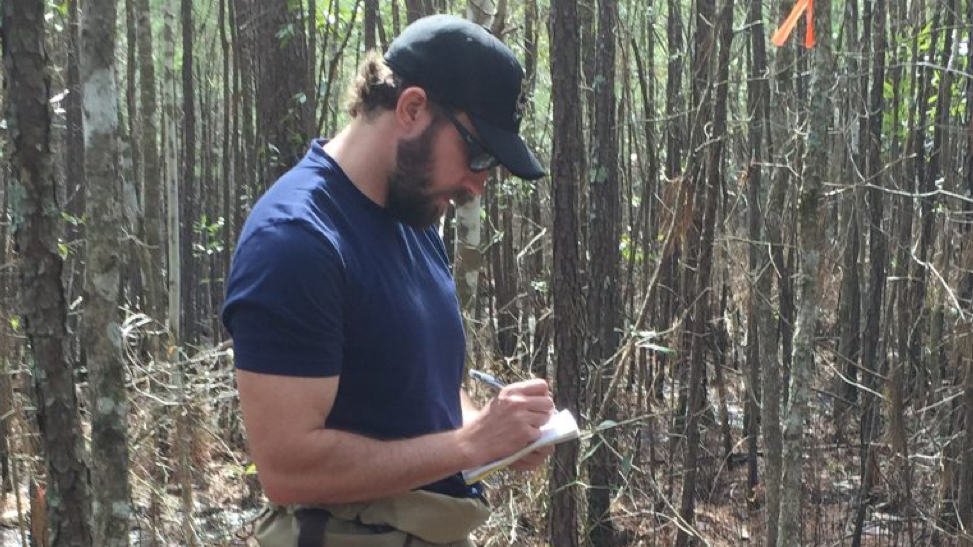Researcher Spotlight – Matthew Stillwagon

Spring 2018 Global Change Fellow
PhD Student, Department of Forestry and Environmental Resources
Advisor: Dr. Marcelo Ardon
Every year the Southeast Climate Science Center funds a multi-disciplinary cohort of Global Change Fellows representing colleges across NC State University. Here are some highlights about Spring 2018 Fellow, Matt Stillwagon, and the applied research he’s conducting.
About You
Can you tell us a little bit about your program and research?
My research, which is being conducted alongside collaborators at Duke and UNC, seeks to determine how sea level rise and saltwater intrusion events are affecting historically freshwater wetlands on the Albemarle-Pamlico Peninsula (APP) in Eastern NC, and to predict how these events will affect the wetlands in the future. In particular, I am studying how nitrogen and phosphorus cycles in the soil and water are altered by elevated salinity. With this research I aim to help preserve these valuable ecosystems, as well as help residents and managers on the APP understand how these landscapes will change under the stress of continued sea level rise.
What influenced you to go into this field of study?
Being born and raised on the Southern California coast, I have always been drawn to the study of coastal habitats. Wetlands are among the most valuable ecosystems in terms of ecosystem services and economic value and so provide a great opportunity to do research that will benefit the residents of these coastal regions and protect these important habitats. I have also found myself drawn to big and complicated questions. The complexity of nutrient cycles, influenced by the multitude of interactions between biota and the physicochemical environment, and the fact that nutrients form the foundation to all life certainly fit the criteria for big, complex questions. Combining all of those factors, coastal wetland biogeochemistry is the perfect fit to tackle a tough question that will benefit both people and the environment.
What do you think is the most pressing issue related to global change?
The most pressing issue(s) related to global change relate to the resources that animals and plants require to live. Water shortages brought on by changes in the water cycle, more and prolonged droughts, altered storm and precipitation activity will be the largest concerns. This is followed by the impacts to food growth and supply. Water shortages are going to make it more difficult to grow the amount of food necessary to sustain the population, which could lead to more and more habitat degradation and land use changed in favor of agriculture. Finding ways to improve our water use efficiency and reduce our water consumption will be the most important factor in our efforts to adapt to climate change.
About Your Results
What results are you finding?
We are working towards quantifying the amount of nitrogen and phosphorus that can be expected to be lost from the wetland system on the Albemarle-Pamlico Peninsula. We have found that previous estimates likely overestimated the amount of N that will be lost due to impending sea level rise. We have also found that the Albemarle-Pamlico estuary system, which is partially protected from the ocean by the Outer Banks, has steadily been increasing in salinity, doubling over the last 40 years. This could pose a serious threat to the second largest estuary in the country, and one of the most important fishery habitats for the whole Atlantic coast.
Who will benefit from your research and how can your research be used to inform management decisions?
My work is part of a larger project that aims first to understand the effects of saltwater intrusion on wetland ecosystems, and second to use that information to preserve these ecosystems through informing managers and policy makers as well as local residents. If we can understand the effects of saltwater intrusion, we will be able to provide support for solutions to mitigate, or slow, the influx of salt into freshwater habitats. We will also be able to predict how nutrient export from wetlands due to saltwater intrusion will affect downstream habitats.
About Your Global Change Fellow Experience
How will the Global Change Fellows Program impact you and your research?
The fellowship provides training in science communication, which will be very valuable when sharing my research with the residents and stakeholders on the peninsula. In addition, the networking opportunities both within the Southeast Climate Science Center and the wider network affiliates will be a valuable career building opportunity.
What do you plan to do after you graduate?
After graduation I would like to remain in academia, or enter the private sector in a research and advisory capacity.
Elements of this post were drawn from a Graduate Student Spotlight written by Erin Champion for the Forestry and Environmental Resources website. See the original post here.
- Categories:
